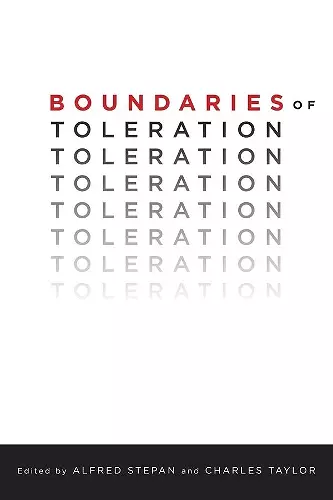Boundaries of Toleration
Charles Taylor editor Alfred Stepan editor
Format:Paperback
Publisher:Columbia University Press
Published:14th Mar '14
Currently unavailable, and unfortunately no date known when it will be back

Distinguished novelists, philosophers, historians, sociologists, and political scientists propose a new approach to settling multicultural tensions in the modern world.
How can people of diverse religious, ethnic, and linguistic allegiances and identities live together without committing violence, inflicting suffering, or oppressing each other? In this volume, contributors explore the limits of toleration and suggest we think beyond them to mutual respect. Salman Rushdie reflects on the once tolerant Sufi-Hindu culture of Kashmir. Ira Katznelson follows with an intellectual history of toleration as a layered institution in the West. Charles Taylor advances a new approach to secularism in our multicultural world, and Akeel Bilgrami responds by offering context and caution to that approach. Nadia Urbinati explores why Cicero's humanist ideal of Concord was not used in response to religious discord. The volume concludes with a refutation of the claim that toleration was invented in the West. Rajeev Bhargava writes on Asoka's India, and Karen Barkey explores toleration within the Ottoman and Habsburg Empires. Sudipta Kaviraj examines accommodations and conflicts in India, and Alfred Stepan highlights contributions to toleration and multiple democratic secularisms in such Muslim-majority countries as Indonesia and Senegal.
The contributors to this volume open up fertile new ground exploring problems, hypotheses, and recommendations in provocative and original ways. Readers will find the fresh thinking exhibited in these pages eye-opening and mind-expanding. -- Hans Oberdiek, Swarthmore College Alfred Stepan and Charles Taylor have played a leading role in getting us to rethink the meaning of political secularism, above all to undermine the simplistic notions that secularism means an absolute separation of 'church and state,' that this is essential to democracy, and that there is only one institutional template for achieving a secular polity. In this collection of essays, they have assembled a set of contributors who look at the varied ways in which quite different societies, past and present, Western and non-Western, have tried to achieve multireligious coexistence and the role of the state in that process. This is just the kind of historical and theoretical inquiry we need as we work through the challenge of crafting a suitably multiculturalized set of secularisms. -- Tariq Modood, University of Bristol A welcome and felicitous addition to the vast literature on the subject. Journal of Church and State
ISBN: 9780231165679
Dimensions: unknown
Weight: unknown
328 pages